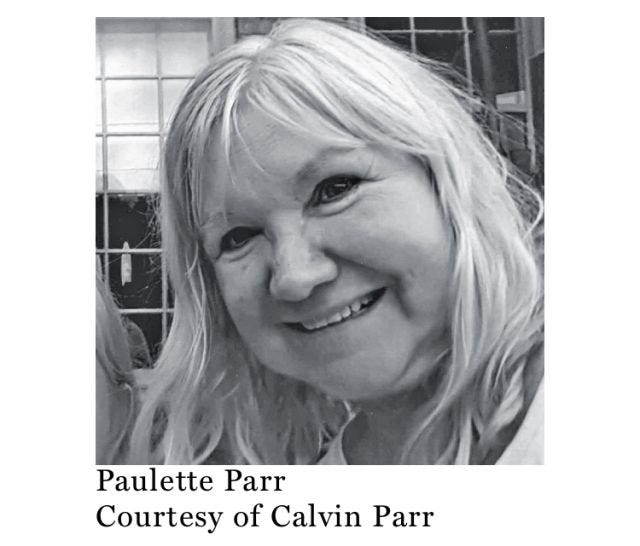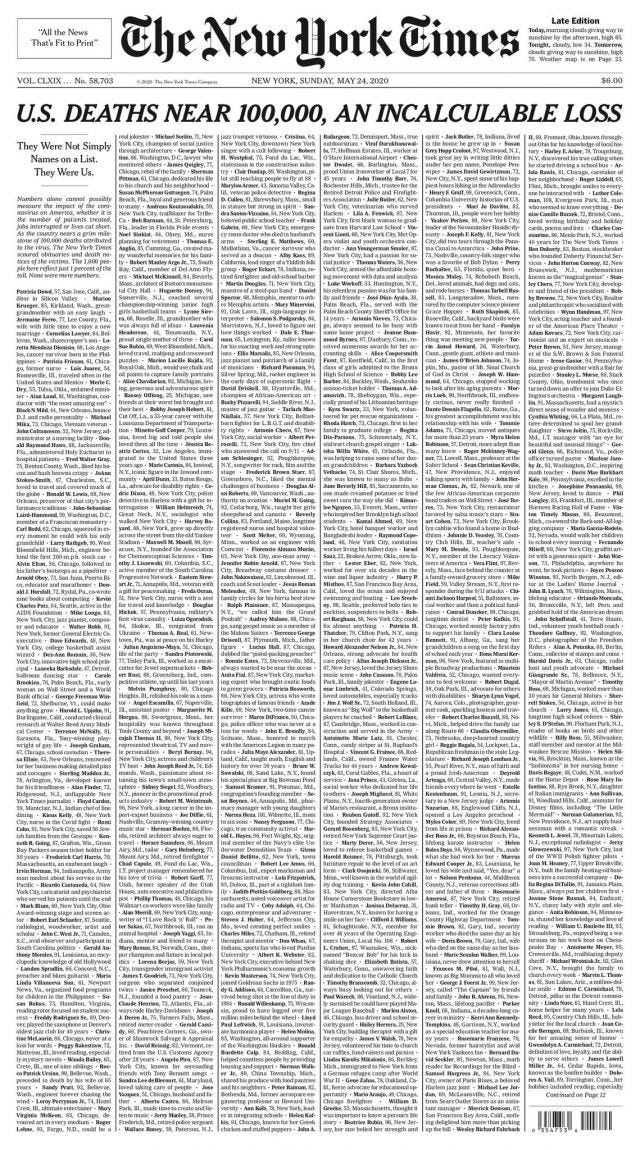Lady Business: Breast implants, 100,000 deaths, and personal loss amid large-scale disaster
Hello, and welcome to Lady Business, a newsletter about women, the business world, and all the ways they overlap. You can sign up for Lady Business and read previous issues here. This is the 102nd issue, published May 24, 2020.

“Even in the face of Armageddon, there are still private armageddons to be faced.”
--Connie Willis, introduction to “Daisy, in the Sun.”
For obvious reasons, I’m thinking a lot these days about apocalyptic science fiction. Recently it’s been the stories of Connie Willis, who often writes about people coping with individual loss during large-scale disasters. A mother’s suicide before the sun goes super-nova. The death of a beloved dog before a pandemic wipes out the species. Or there’s the even more grimly appropriate Doomsday Book, which imagines a time traveler fleeing a futuristic pandemic and landing in the middle of the Black Death.
How do you separate individual loss from the large-scale Armageddon, whether that’s a pandemic or anything else? And what if your private armageddon is part of a less immediate but also large-scale disaster?

In between covering pandemic-related medical shortages, I spent much of this spring talking to people affected by a different but longer-running healthcare crisis. The resulting story, which Fortune published in its June/July issue, is about the sweeping, long-standing problems with breast implants, and the health risks they’re still posing for millions of women. It’s also about one woman who died in August:
“A woman is more likely to be struck by lightning than get this condition,” an Allergan spokeswoman declared. It was January 2011, more than a decade after the first reported case of lymphoma tied to breast implants. The FDA had just issued its first public warning that women with breast implants “may have a very small but increased risk of developing” a disease then called anaplastic large cell lymphoma (ALCL). And in Missouri, Paulette Parr had just gotten her second set of [Allergan] Biocell implants.
…As Allergan rode the M&A merry-go-round, the chances that a woman with breast implants would be diagnosed with BIA-ALCL climbed from one in 500,000 in 2011 to one in 3,800 in 2019. Peter Cordeiro, a Memorial Sloan Kettering plastic surgeon who followed his patients for 27 years and almost exclusively used Allergan implants, estimates that his patients now have a one in 355 chance of developing the cancer.
But in 2018, the FDA still didn’t seem worried and neither was Paulette Parr—even when she noticed a pimple-size growth under her arm. She went in to have it checked, only to learn in November that she had this thing called BIA-ALCL.
Parr was 67 then, a newly retired grandmother, taking weekend jaunts to Memphis and looking forward to visiting New York City for the first time. And at first, her diagnosis didn’t sound so dire. The doctor told her, “You give me six sessions of chemo, it’ll be gone,” Calvin Parr recalls. “That relieved us really well.”
Allergan, the pharmaceutical company best known for making Botox, was recently sold to Humira maker AbbVie; a spokesperson declined to comment on the lawsuits it is now facing from Calvin Parr and many others over problems associated with its breast implants, some of which the FDA asked Allergan to recall last summer. In emailed responses to my questions, a spokesperson told me Allergan “has a demonstrated history of dedication to the health and safety of patients.”
Some of my story touches upon the coronavirus; the pandemic's shutdown of most elective procedures, including plastic surgery, has amplified an existing post-recall slowdown in the business of breast implants. But much of what I discovered involves other healthcare, regulatory, business, and medical issues. I spoke with more than 30 people in various fields since February, including several doctors, lawyers, and public health experts, as well as FDA medical-devices official Binita Ashar. And I had long, sometimes-devastating conversations with women or the survivors of women who have been affected by problems with their breast implants.
So I spent some of my Covid spring listening to Calvin Parr, quarantined in his grief, tell me about the death of the beloved wife he always expected to outlive him. I listened to women stay calm and matter-of-fact as they told me about their diagnoses of breast implant-associated lymphoma; and then I heard their voices break as they talked about the guilt they felt -- or were made to feel -- for bringing this cancer upon themselves, because they got breast implants for “vanity.” I listened to women who originally got breast implants for cancer-related reasons, after mastectomies, tell me about the terror and stress they felt when they discovered that these medical devices that were supposed to help their health instead put them at new risk.
For many of these women, and those I’ve heard from since the story was published this week, their health problems were compounded by the lack of information or warning they received about the potential risks of the devices. Which is part of how something that’s supposed to be elective and fun, or clinical and helpful for cancer patients, turns into a source of risk for millions of women.
It's obviously a different and more niche healthcare disaster than the ones dominating the headlines for these past months, and inspiring another devastating front page this weekend. But for many of the women I spoke to, it's sad and infuriating because it was also more preventable, if there had only been more study and regulation and clear disclosure to patients.
“Everybody loves their implants ‘until.’ My ‘until’ was 18 years,” as Carol Small, a breast cancer survivor who got a textured implant in 1999 and was diagnosed with BIA-ALCL in 2017, told me. “We need to have good, informed choices.”
Lady Bits
--"Some of the free-floating grief that the coronavirus has unleashed among the otherwise rich, safe, and secure is actually grievance: the computer’s saying no, the universe won’t make an exception no matter what you try." Speaking of individual loss set against a backdrop of global crisis, please read the New Yorker’s Lauren Collins on losing her father to leukemia at a pandemic-enforced distance.
--Book rec: I started my Memorial Day weekend tearing through Naomi Novik’s Uprooted, a fairy tale about evils trees, medieval Polish-Russian wars, and nuanced female friendship, all of which made for exactly the right amount of well-written escapism this long weekend needs.
--But of course King Arthur Flour’s headquarters would be called “Carbohydrate Camelot.” (And a rec for its basic pizza crust recipe, which I’m now making on a nearly-weekly basis.)
--"In the circuits of culture, there are routes to legitimacy and fame, and the problem we have in the food world is that the most reliable path seems to center whiteness again and again." Eater on Alison Roman, and who gets to be a food celebrity.
--"Every single thing is up for negotiation and renegotiation. It's exhausting," and "please forgive any typos or weird sentences; I am writing this fucking thing during a global pandemic.” This week’s mood, via Ann Friedman and Anne Helen Petersen.
Thank you for reading, commenting, and subscribing to this newsletter! Please tell your friends to sign up here, let me know what you think about this week's issue, and what else you'd like to see me write about: maria.aspan@gmail.com


